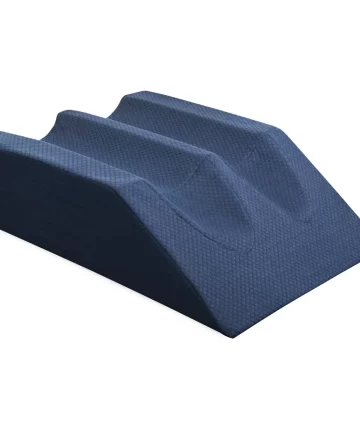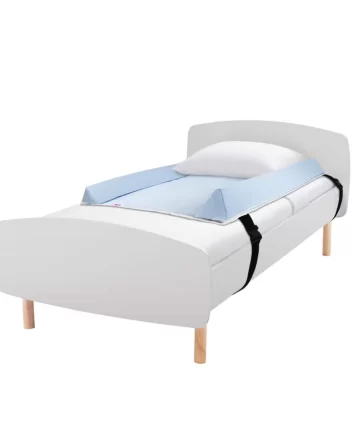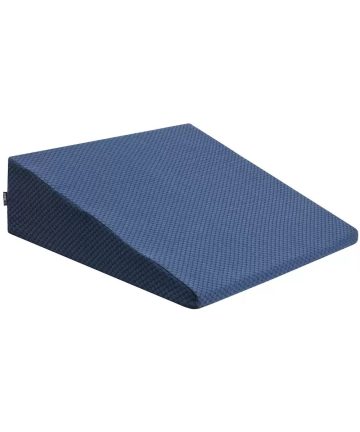Wedge pillows are an innovative solution for people who struggle with a range of sleeping issues and health problems. These pillows are designed with a triangular shape that provides elevated support for the head, neck, and upper body. Unlike traditional pillows that simply support the head and neck, wedge pillows aim to improve sleep quality, reduce snoring, relieve acid reflux and other digestive issues, and even provide support for back pain.
What are Wedge Pillows? Wedge pillows are shaped like a triangle and are typically made from foam, memory foam, or air-filled materials. They come in various sizes and heights, and some models are also adjustable to accommodate different sleeping positions. The inclined angle of the pillow provides elevated support for the head, neck, and upper body, which can improve breathing and reduce snoring. Additionally, the wedge design can also alleviate acid reflux and other digestive issues by keeping the upper body elevated during sleep.
Benefits of Wedge Pillows
Better Sleep Quality: Wedge pillows can help people sleep better by improving breathing and reducing snoring. The elevated angle of the pillow allows air to flow freely, reducing the likelihood of snoring and sleep apnea. Additionally, wedge pillows can also reduce discomfort and pressure on the head, neck, and back, leading to a more restful sleep.
Relief from Acid Reflux and GERD: Acid reflux and gastroesophageal reflux disease (GERD) are conditions in which stomach acid backs up into the esophagus, causing discomfort and sometimes heartburn. Wedge pillows can alleviate these symptoms by keeping the upper body elevated during sleep, which reduces the likelihood of acid reflux.
Support for Back Pain: Wedge pillows can also provide support for back pain by keeping the spine aligned while sleeping. This can be particularly helpful for people who suffer from lower back pain or have trouble sleeping on their back.
Versatility: Wedge pillows are versatile and can be used for a range of purposes, including reading, watching TV, or simply lounging. Additionally, some wedge pillows come with removable covers, making them easy to clean and maintain.
Why Use a Wedge Pillow?
Wedge pillows are a great solution for people who struggle with sleeping issues and health problems. They provide elevated support for the head, neck, and upper body, which can improve breathing, reduce snoring, and relieve acid reflux and other digestive issues. Additionally, wedge pillows can also provide support for back pain and can be used for a range of purposes.

Choosing the Right Wedge Pillow
When choosing a wedge pillow, there are a few factors to consider. First, you’ll want to decide on the height of the wedge. Wedge pillows come in different heights, and the height you choose will depend on your needs and personal preference.
If you suffer from acid reflux, a higher wedge pillow may be more effective. If you’re just looking for a little extra support, a lower wedge pillow may be sufficient.
You’ll also want to consider the material of the wedge pillow. Memory foam is a popular choice because it conforms to your body and provides excellent support. Latex is another option that is more firm and supportive than memory foam. Inflatable wedge pillows are also available and can be a good choice for travel or for people who want to adjust the height of their wedge pillow.
Frequently Asked Questions About Wedge Pillows
What is the proper way to sleep on a wedge pillow?
Sleeping on a wedge pillow can be different from sleeping on a traditional flat pillow, but the proper way to use it largely depends on your individual needs and preferences. Here are some general guidelines for sleeping on a wedge pillow:
Elevate the Upper Body: Wedge pillows are designed to elevate the upper body, which can help improve breathing and reduce snoring, acid reflux, and other digestive issues. To achieve this, the pillow should be positioned under the head, neck, and upper back. Some people prefer to sleep on the back, while others find it more comfortable to sleep on their side.
Find the Right Angle: The angle of elevation is an important factor in determining the effectiveness of the wedge pillow. Some people prefer a gentler incline, while others prefer a more pronounced angle. It may take some trial and error to find the right angle for you, but it’s important to find one that is comfortable and provides adequate support for your head, neck, and upper body.
Adjust the Height: The height of the pillow can also affect your comfort and the effectiveness of the wedge pillow. Some models come with adjustable heights, while others have a fixed height. If you’re using a wedge pillow for the first time, it may take some time to get used to the height, so it’s important to be patient and give your body time to adjust.
Use a Pillow: To maximize comfort, it’s a good idea to use a pillow on top of the wedge pillow to support your head and neck. This will help keep your neck and spine in a neutral position, reducing the risk of neck pain and stiffness.
Experiment with Sleeping Positions: Finally, it’s important to experiment with different sleeping positions to find the one that works best for you. Some people find it most comfortable to sleep on their back, while others prefer to sleep on their side. It may take some time to find the right position, so be patient and keep trying different positions until you find one that works for you.
What are the side effects of wedge pillows?
Wedge pillows are generally considered safe for most people and do not have any major side effects. However, in some cases, using a wedge pillow may cause discomfort or other minor issues. Here are some potential side effects of using a wedge pillow:
Discomfort: Wedge pillows can be uncomfortable for some people, especially if they are not used to sleeping at an elevated angle. It may take some time to get used to the pillow, so it’s important to be patient and give your body time to adjust.
Neck Pain: If the pillow is too high, it can put pressure on the neck, leading to pain and stiffness. To avoid this, it’s important to find the right height and angle for your individual needs and to use a pillow to support your head and neck.
Skin Irritation: If the wedge pillow is made from materials that irritate your skin, you may experience itching, redness, or other skin reactions. To avoid this, it’s important to choose a pillow made from materials that are hypoallergenic and gentle on the skin.
Interference with Breathing: If the pillow is too high, it can interfere with breathing, especially for people who have sleep apnea or other respiratory conditions. To avoid this, it’s important to find the right height and angle for your individual needs and to talk to your doctor if you have any concerns.
Dependence: Some people may become dependent on the wedge pillow and find it difficult to sleep without it. This can be particularly problematic if you travel frequently or need to sleep in different environments.
Is it good to sleep with head elevated?
Sleeping with your head elevated can have some potential benefits for some people, although it may not be ideal for everyone. Here are a few of the benefits of sleeping with an elevated head:
Improved Breathing: Elevating your head can help improve breathing, especially for people who have sleep apnea, snoring, or other respiratory problems. Sleeping at an incline can help keep the airways open and reduce the risk of obstructions, which can lead to improved breathing and a more restful sleep.
Reduced Acid Reflux: Sleeping with your head elevated can help reduce acid reflux and heartburn by preventing stomach acid from flowing back into the esophagus. This can help relieve symptoms such as acid reflux, heartburn, and indigestion, leading to a more comfortable and restful sleep.
Reduced Snoring: Sleeping at an incline can also help reduce snoring by keeping the airways open and reducing the risk of obstructions. This can help improve sleep quality for both the person who snores and their bed partner.
Improved Circulation: Elevating your head can also help improve circulation by reducing the pressure on your head, neck, and spine. This can help reduce swelling, minimize neck and back pain, and improve overall comfort.
However, it’s important to note that sleeping with your head elevated may not be ideal for everyone. Some people may find it uncomfortable or difficult to sleep at an incline, especially if they are used to sleeping on a flat surface. Additionally, sleeping with your head elevated can put extra pressure on the neck and back, leading to pain and stiffness.
How often should I replace my wedge pillow?
The frequency with which you need to replace your wedge pillow will depend on several factors, including the material, usage, and overall quality of the pillow. Here are a few general guidelines for when to replace your wedge pillow:
Material: If the pillow is made from materials that deteriorate quickly, such as foam, you may need to replace it more frequently than a pillow made from more durable materials, such as memory foam or latex.
Usage: If you use your wedge pillow frequently and on a daily basis, it may need to be replaced more often than if you only use it occasionally.
Quality: Higher quality wedge pillows are generally more durable and can last longer than lower quality alternatives. Investing in a high-quality pillow can save you money in the long run, as you may not need to replace it as often.
In conclusion, wedge pillows are a versatile and effective solution for people who struggle with sleeping issues and health problems. They provide elevated support for the head, neck, and upper body, which can lead to better sleep quality, relief from acid reflux and other digestive issues, and support for back pain. If you’re looking for a solution to improve your sleep and overall health, a wedge pillow may be just what you need.
-
 Double Leg Elevator Positioning Wedge$119.00 incl. gst
Double Leg Elevator Positioning Wedge$119.00 incl. gst -
 Replacement Cover For Body Support Bed Wedge Pillow In Blue Or White
Replacement Cover For Body Support Bed Wedge Pillow In Blue Or White -
 Replacement Cover For Leg Elevation Wedge In Blue Or White
Replacement Cover For Leg Elevation Wedge In Blue Or White -
 Ergonomic Leg Elevation Wedge Pillow$89.99 incl. gst
Ergonomic Leg Elevation Wedge Pillow$89.99 incl. gst -
 Bedside Bumpers Wedge System for Falls Prevention$399.00 incl. gst
Bedside Bumpers Wedge System for Falls Prevention$399.00 incl. gst -
 Body Support Wedge Pillow For the Bed – high density rebound memory foam for support$89.99 incl. gst
Body Support Wedge Pillow For the Bed – high density rebound memory foam for support$89.99 incl. gst




